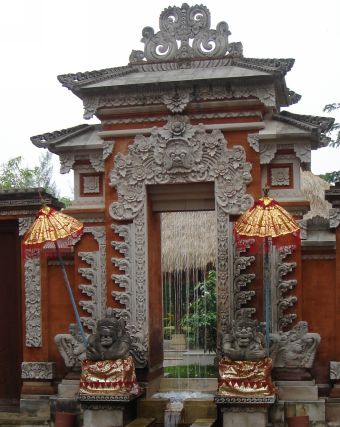Indonesia’s wealthy partake of a booming spa tourism industry, joining a pan-Asian community of well-to-do consumers of the ‘non-west’
Bart Barendregt
Balinese entrance to the Tea Tree spa at the
|
A Javanese businesswoman, Martha Tilaar, popularly known as the ‘mother of natural based cosmetics’, has recently launched her 'Dewi Sri' line of body scrubs, advertised as ‘the secret of the tropical goddess’. Her website explains that: ‘Indonesian folklore tells of an ancient remedy inspired by the goddess of fertility and prosperity of rice fields and crop harvest. Her beautiful, healthy skin is the emanation of a timeless beauty ritual enhanced by traditional bathing.’ Tilaar’s recipes are believed to be based on the traditional ingredients used by the princesses of the palaces of Central Java, which adds to the product’s aura of mystery. These ancient secrets for beauty and health are now available to ordinary women.
The ancient secrets of Javanese beauty is an example of the recent boom in Asian style eco-chic. The preference for natural, ‘local’ products reminds us of how, among wealthy Indonesians, it is now modern and fashionable to read the ‘Asian philosophies’ of Deepak Chopra or to build a house based on the principles of feng shui. Rather than fast food chains like McDonald’s or Pizza Hut, one eats nasi kampung (village-style fried rice) in posh restaurants and drinks traditional and organically grown coffees at Starbucks or the local equivalent of such classy coffee bars. These practices are increasingly part of the identikit of the well-to-do in Indonesia, as elsewhere in Southeast Asia. Asian style eco-chic offers new opportunities for constructing new, ‘distinguished’ communities – communities that straddle the borders separating Asian countries, uniting those sufficiently endowed to dedicate themselves to this brand of consumerism.
Rather than fast food chains like McDonald’s or Pizza Hut, one eats nasi kampung in posh restaurants and drinks traditional and organically grown coffees at Starbucks
Crazy for spas
 |
The massage tables are decorated with batik at the Javanese Wellness Centre in the Holiday Inn, Batam
|
The complexities of eco-chic and its associated new Asianism are nowhere better captured than in the current tropical spa craze. Tropical spas are lavishly designed destination resorts where one can stay overnight and where visitors are offered an amalgam of beauty, health and spiritual practices. The past few years have seen an enormous boom in such tropical spas, which can be found in places like Phuket, Kerala, Manila and Singapore. Bali has hundreds of them. Here one can enjoy a traditional massage, aromatherapy, or simply relax, later enjoying an al fresco dinner while listening to traditional gamelan music.
To an outsider it might seem curious to hear of Jakarta elites going on weekend retreats to the Central Javanese countryside to enjoy forgotten foods and learn to appreciate their own ‘authentic culture’ among farmers. After all, not long ago, those same farmers might have been considered as backward, resisting progress, and quite un-modern in all respects. Also notable is that this experience comes at a price that is many times over what the average farm family earns in a month: access to Asian-style eco-chic is restricted to the happy few.
Aristocratic values
 |
A tiny wayang puppet greets visitors in the waiting room, Holiday Inn, BatamLenore Lyons |
However, the irony is not so great as it might appear at first sight. Spa culture often makes an explicit link with aristocratic values, portraying the new leisure elite as willingly identifying itself with ‘traditional’ rulers of the past. Promotional literature describes both the Mandara Spa at the Ibah hotel in Bali, and the Pita Maha Private Villa Spa as the property of Balinese royal families. Mooryati Soedibyo runs Mustika Ratu, a famous Indonesian band of natural cosmetics. According to her company website, Soedibyo ‘is a princess who grew up inside the Surakarta keraton (palace) under the watchful eyes of her grandparents. The aristocratic traditions of the keraton were a part of the princess’ daily life from the very beginning.’
Rich Indonesian spa tourists are just one example of how, in the aftermath of the government-led ‘Asian values’ debates of the mid-1990s, it is now popular cultural forms, and not policy, that lead the way to building a sense of Asian-ness. In the aftermath of these top-down, much politicised approaches, expressions of Asian-ness now are now manifest in such popular cultural forms as filmmaking, fashion, as well as among rich Indonesian spa tourists. ii
Bart Barendregt (barendregt@fsw.leidenuniv.nl) is an anthropologist who lectures at the Institute of Social and Cultural Studies, Leiden University, the Netherlands. He has published on Southeast Asian performing arts, new and mobile media and Islamic pop music. His present research concerns youth, digital technology and visions of the future











